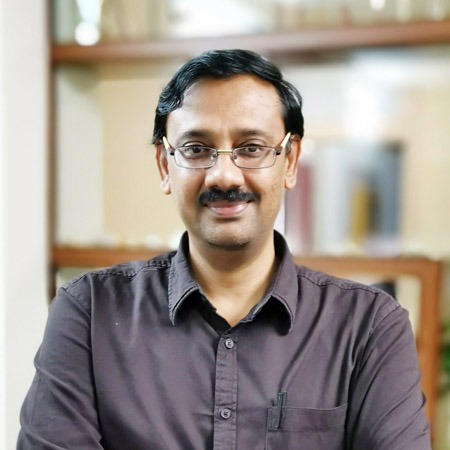

Dr. R. C. Koumar
Associate Professor
- Website
-
PhD, Zoology, Banaras Hindu University
-
MSc: Life Sciences
-
rckoumar@yenepoya.edu.in
I received my Ph.D. from Banaras Hindu University, where I explored the mechanisms of differential gene regulation by Androgen Receptor promoter during aging in the mouse brain cortex. Having gained experience in molecular neurobiology, I joined as a postdoc at NBRC, Manesar, for understanding the role of Estrogens as neuroprotectors of Parkinson’s and Alzheimer’s disease. After that, I joined as a postdoc in Prof. Pierre Chambon lab to work on the role of nuclear receptors in Prostate Cancer to develop and validate mouse models that mimic the kinetics of human prostate cancer progression. Subsequently, I moved to A*STAR IMCB, as a research fellow to investigate the role of Cdks and epigenetic modifiers in Head and Neck and Gastric cancer and profiled patient tumors for pre-clinical testing of chemotherapeutic responses using PDX. After that, I joined as an Associate Professor at YRC in 2018 to continue working on Epigenetics and Cancer Biology.
PostDoc/Experience
Associate Professor (2018-till date) – Yenepoya Research Centre, Yenepoya (Deemed to be University), Mangaluru, India.
Research Fellow (2008-2016) – Cell Division and Cancer Research Lab and Mouse Models for Human Cancer Unit, Institute of Molecular and Cell Biology (A*STAR), Biopolis, Singapore.
Postdoctoral Fellow (2005-2008) – Department of Functional Genomics and Cancer, Institut de Génétique et de BiologieMoléculaire et Cellulaire (IGBMC), Strasbourg, France.
Postdoctoral Fellow (2004-2005) – Division of Molecular and Cellular Neurosciences, National Brain Research Centre (NBRC), Manesar, Haryana, India
Awards/Honors
- IMCB, Research Fellowship (2008-2016) – Institute of Molecular and Cell Biology (IMCB), Singapore.
- Foundation pour la Recherche Médicale (FRM) Fellowship (2006-2008) – Institut de Génétique et de BiologieMoléculaire et Cellulaire (IGBMC), Strasbourg, France.
- Association pour la Recherche sur le Cancer (ARI) Fellowship (2005-2006) – Institut de Génétique et de BiologieMoléculaire et Cellulaire (IGBMC), Strasbourg, France.
- NBRC, Postdoctoral Research Fellowship (2004-2005) – National Brain Research Centre (NBRC), Haryana, India.
- University Grants Commission (UGC) Fellowship (1999-2004) – Centre for Advanced Studies in Zoology, Banaras Hindu University, India.
- Qualified Graduate Aptitude Test in Engineering (GATE) conducted by Ministry of Human Resources Development, Govt. of India.
Research Interest/Area
Molecular Cell Biology, Cancer Biology, Epigenetics
Research
One of the major hallmarks of Cancer is the aberrant epigenetic modifications in chromatin machinery by which the cells attain a limitless atypical replicative state potentiating cellular proliferation and tumorigenesis that metastasize to distant organs if unchecked. Cancer remains a major burden and public health problem despite the molecular understanding of the disease. The advent of new Omic technologies for profiling different tumors has led to the identification of molecular subtypes of cancers that guide robust early diagnosis and appropriate therapeutic interventions.
Main Objectives:
- Elucidating epigenetic mechanisms driving cell cycle in different cancer types
- Identify and validate biomarkers for early detection and diagnosis of cancer and its recurrence
- Epigenetic role of Cdks in meiosis
- Tissue regenerative role of Cdks
- Krishnan S, Kanthaje S, Punchappady DR, Mujeeburahiman M, Ratnacaram C.K.*. Circulating metabolite biomarkers: a game changer in the human prostate cancer diagnosis. J Cancer Res Clin Oncol. 2023 Mar;149(3):951-967. (*Corresponding Author)
- Johnson RP*, Ratnacaram C.K.*, Kumar L, Jose J. Combinatorial approaches of nanotherapeutics for inflammatory pathway targeted therapy of prostate cancer. Drug Resist Updat. 2022 Sep; 64:100865. (*Contributed Equally)
- Kanthaje S, Baikunje N, Kandal I, Ratnacaram C.K.*. Repertoires of MicroRNA-30 family as gate-keepers in lung cancer. Front Biosci (Schol Ed). 2021 Dec 3;13(2):141-156. (*Corresponding Author)
- Nathan Palmer, S. Zakiah A. Talib*, Ratnacaram C.K.*, Diana Low*, et al (2019). CDK2 regulates the NRF1/Ehmt1 axis during meiotic prophase I. The Journal of Cell Biology 218(9): 2896-2918; DOI: 10.1083/jcb.201903125 (* Contributed equally)
- Sangeeta Chauhan, M. Kasim Diril, Vanessa Manoharan, Joanna H.S. Lee, Juliane Noffke, Deepak Adhikari, Ratnacaram C.K. et al. (2016) The catalytic activity is essential for the in vivo functions of Cdk2. Biochem J 473:2783–2798.
- Michael Dewaele, Tommaso Tabaglio, Karen Willekens, Marco Bezzi, Shun Xie Teo, Diana HP Low, Cheryl Koh, Florian Rambow, Mark Fiers, AljosjaRogiers, Enrico Radaelli, Muthafar Al-Haddawi, Soo Yong Tan, Els Hermans, Frederic Amant, Hualong Yan, Manikandan Lakshmanan, Ratnacaram C.K. et al. (2016) Enhanced MDM4 exon 6 inclusion is a widespread oncogenic mechanism and a clinically compatible therapeutic target. J Clin Invest. 126:68-84.
- Mannose receptor-targeted dual stimuli-responsive prodrug nanocarriers for Ovarian cancer targeted delivery of Camptothecins.
PI/Co-PI: Dr. Renjith P. Johnson, Dr. R.C. Koumar, Dr. Rohan Shetty and Dr. Mariam Anjum Ifthikar.
Funding: Shabana Faizal Foundation Grant
